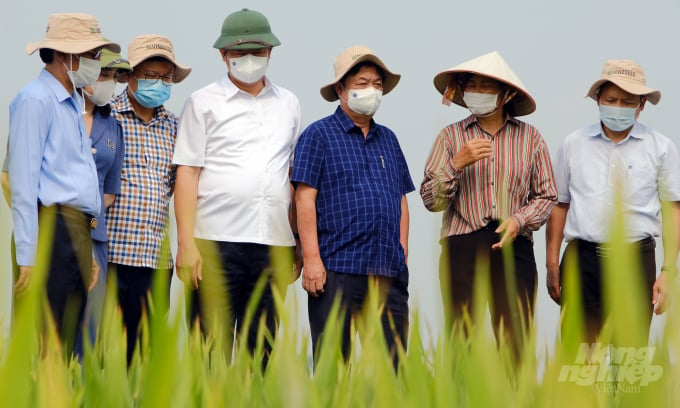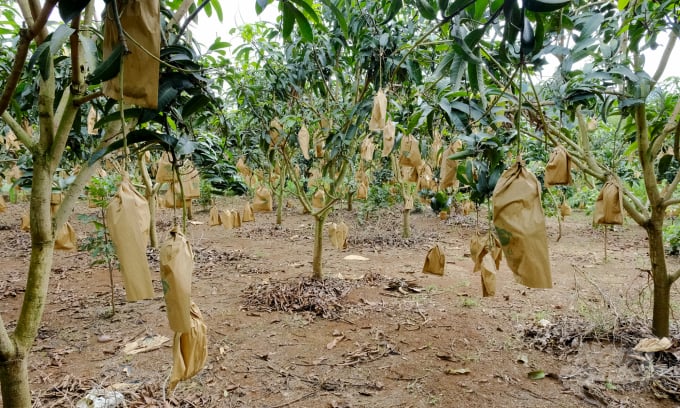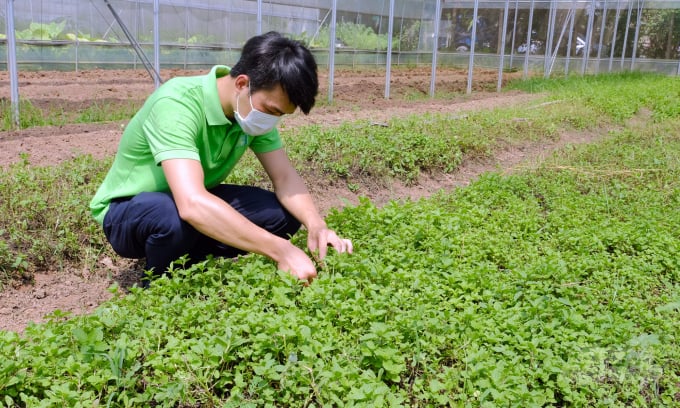June 19, 2025 | 15:36 GMT +7
June 19, 2025 | 15:36 GMT +7
Hotline: 0913.378.918
June 19, 2025 | 15:36 GMT +7
Hotline: 0913.378.918
He said: “It is essential to tell the world that Vietnam agriculture is a responsible sector, to international standards at first and then to the customers. Vietnam needs to demonstrate its opinion on a picture with national stature.”

Minister Le Minh Hoan (blue striped shirt) visits a model of rice production in Quang Phu Cau commune, Ung Hoa district, Hanoi city in early June 2021. Photo: Bao Thang.
In the following speeches, Minister Le Minh Hoan clarified what is “responsible agriculture”. As mentioned by him, traditional agriculture is strongly shifting to not only the level of mechanization, electrification, and irrigation but also towards organic, smart, precise, and responsible agriculture.
Responsibility must come first from the producers. Each farming household, cooperative needs to strictly follow the production process to create qualified products, ensure food hygiene and safety, and traceability.
“Each agricultural product needs to demonstrate its story and help elevate consumers’ experience. How to make the consumers realize the producers’ commitment and the agricultural sector and society’s obligation,” Minister Le Minh Hoan said.
The responsibility may be sensed via the strategy of integrated plant health management, which soon to be deployed by the Plant Protection Department.
Vietnam agriculture is coping with series of issues including large export volume but low selling price, chemical, and antibiotic residues, limited safe and effective use of pesticides among others. MARD also needs to consider comprehensive solutions to handle issues and risks from climate change, transboundary pest immigration, or environmental crisis.

Farmers in Mai Son district, Son La province cover mango trees to prevent pests, reduce the risk of pests and diseases, and pesticide residues. Photo: Bao Thang.
The concept of "One Health" (OH) was developed by the Food and Agriculture Organization of the United Nations (FAO) in 2008 as a strategic framework to address a range of aforementioned problems. FAO believes that it is necessary to gather strength from many sectors to be able to prevent and minimize threats to human health - environment - animals - plants. Thanks to the determination of FAO, 2020 has been chosen by the United Nations as the year of crop health.
"The connotation of Plant Health (PH) is integrated pest management (IPM) but it was viewed in a broader perspective," said Deputy Director of the Plant Protection Department Nguyen Quy Duong. According to Duong, crop health is a new message, aiming to turn Vietnam into a responsible agricultural producer for the world. Building on what IPM has done, the agricultural sector will incorporate human health, ecosystem impacts, soil health, and more.
A few countries have approached this term including Australia, Hollands. In Southeast Asia, plant health remains a strange term to almost all countries in the region. “Vietnam should make effort to raise the pioneer flag in this movement,” Duong stressed.
Plant health is considered a new approach that in line with climate change, the reduction of biological diversity, environment protection, and a pillar for the MARD to access to One Health proposed by FAO.

Growing vegetables in a greenhouse at a cooperative in Van Duc commune, Gia Lam district, Hanoi. Photo: Bao Thang.
To solve plant health, the agricultural industry will comprehensively manage the problems of pests, food safety, and ecosystem quality. It also matches the industry's policy, which is to create a single output that summarizes the whole process.
For the part of the crop protection industry, the object of responsible agriculture was previously limited to fertilizers and biological products but now extends to plant health. Based on advice from the Department of Plant Protection, MARD approved the project "Support to develop the Strategy and Action Plan for Integrated Plant Health Management" (IPHM). The goal includes enhancing food security, environmental sustainability, and food safety through increasing the capacity of the plant protection system.
Build up national strategy on plant health
IPHM project is temporarily divided into three parts with three outputs. The first part is to develop a national strategy for plant health, which integrates food safety, climate change adaptation, and transboundary pest management.
The second part is to develop a national strategy for integrated crop health management (NP-IPHM) for the 2021-2025 period, which integrates food safety, pest management, and risks from pesticides. The last part is the training of lecturers and related staff supporting NP-IPHM.
As a focal point, the Plant Protection Department will coordinate with FAO and the Department of International Cooperation (MARD) to ensure the project is on schedule.
Director of Plant Protection Department Hoang Trung said the project to improve plant health will be implemented from July 2021. "Improving plant health is a long-term plan of the agricultural industry. The program is fastened upon the people, bringing many benefits to the environment as well as the output products," Trung assessed.
Translated by Linh Linh
![Turning wind and rain into action: [9] Digitizing hydrometeorological data in response to climate change](https://t.ex-cdn.com/nongnghiepmoitruong.vn/608w/files/news/2025/06/17/z6704423696987_15fd32ffc26d590d204d520c9dac6786-nongnghiep-165943.jpg)
(VAN) Farmers have begun accessing hydrometeorological applications to adjust their cropping schedules, aiming to ensure productivity and adapt to climate change.
![Turning wind and rain into action: [8] Real-time salinity detection and early warning technology](https://t.ex-cdn.com/nongnghiepmoitruong.vn/608w/files/news/2025/06/17/z6704423696987_15fd32ffc26d590d204d520c9dac6786-nongnghiep-151127.jpg)
(VAN) Thanks to the integration of modern hydrological-hydraulic models, remote sensing technologies, and artificial intelligence, the accuracy of hydrological forecasting has significantly improved.
![Turning wind and rain into action: [7] Early disaster warnings help marine farmers minimize losses](https://t.ex-cdn.com/nongnghiepmoitruong.vn/608w/files/news/2025/06/17/z6704423696987_15fd32ffc26d590d204d520c9dac6786-nongnghiep-142942.jpg)
(VAN) In recent years, thanks to early disaster warnings and forecasting, marine farmers in Khanh Hoa province have been able to reduce risks and losses, thereby improving production efficiency.
![Turning wind and rain into action: [6] ‘Four on-the-spot’ disaster management software](https://t.ex-cdn.com/nongnghiepmoitruong.vn/608w/files/news/2025/06/17/e5a48259d6a262fc3bb3-nongnghiep-183800.jpg)
(VAN) By simply activating the scenario on the disaster management software, the relevant authorities immediately know how many households need to be evacuated, where to evacuate them to, and by what means of transportation…
![Turning wind and rain into action: [5] Hue applies modern technology in disaster forecasting](https://t.ex-cdn.com/nongnghiepmoitruong.vn/608w/files/news/2025/06/17/z6704423696987_15fd32ffc26d590d204d520c9dac6786-nongnghiep-093938.jpg)
(VAN) In Hue city, modern technology has recently been applied in meteorological and hydrological forecasting and warning, helping to reduce the damage caused by natural disasters.

(VAN) A cutting-edge farming technique being implemented on an experimental ranch in Arizona's Sonoran Desert has already saved a billion gallons of water over five years, according to Civil Eats.

(VAN) Poultry and pig production and the environment can be boosted through enhanced water technology, according to new research.